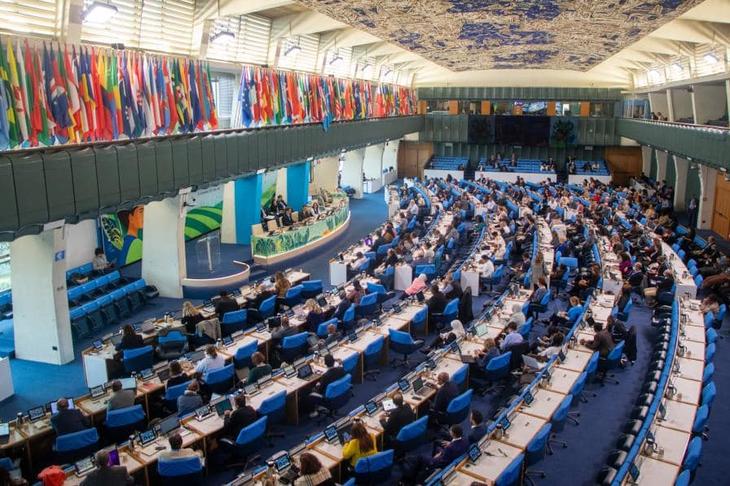
Tenth Session of the Plant Treaty’s Governing Body, Italy, 2023
At this session the Governing Body took note of the outcomes of the Global Symposium on Farmers’ Rights in India and decided to reconvene the Ad Hoc Technical Expert Group on Farmers’ Rights to follow up on the implementation of Article 9.
Under the agenda item on Farmers’ Rights, the Secretariat presented a report of implementation of Farmers’ Rights during this biennium. In this context, India presented a brief report from the Global Symposium on Farmers‘ Rights that took place in New Delhi around two months earlier. On this backdrop, and after a round of statements from the Contracting Parties also addressing the draft resolution presented by the Secretariat, a Contact Group was appointed to negotiate the details of a resolution on Farmers’ Rights.
The Contact Group met twice. At the first session, co-chaired by Svanhild-Isabelle Batta Torheim (Norway) and Dinesh Agarwal (India), consensus was achieved on all elements of the resolution text, except of an annexed outline for an assessment of the implementation of Farmers’ Rights with an indicative methodology and the related Terms of Reference for a reconvened Ad Hoc Technical Expert Group on Farmers’ Rights (AHTEG-FR). At the second session, Norway presented an alternative outline of that assessment in an effort to reach consensus. North America argued that arriving at an outline for the assessment should be part of the mandate for a reconvened AHTEG-FR and not to be discussed in the contact group. Most countries of the Global South taking the floor argued in preference of the Norwegian proposal and that adopting the outline at GB10 would enable sufficient time to carry out the assessment itself before the next session of the Governing Body, thus making more progress.
Much time elapsed in negotiating a solution that could not be found during the second session of the Contact Group, due to the strong positions of the parties. At the next plenary meeting, despite procedural customs to do so, the Contact Group was not invited to present the report of their work from the two meetings. The Chairperson of GB10, Yasmina El Bahloul (Africa Region), established a Friends of the Chair Group to finalize the work. The co-chairs of the Friends of the Chair Group, Kim Van Seeters (Netherlands) and Dinesh Agarwal (India), facilitated consensus that finalizing the outline should be part of the mandate for the new AHTEG-FR. During the subsequent plenary session to adopt the resolution on Farmers’ Rights, parts of the resolution text had to be renegotiated, as the Contact Group had not been invited to present its results to the plenary.
Finally, Resolution 7/2023 could be adopted in the plenary. The resolution builds on previous resolutions of the Governing Body and repeats many of the previous provisions. What was new this time, was particularly that the Governing Body requested the Secretary to invite Contracting Parties and other interested stakeholders, especially farmers’ organizations, to submit inputs and comments on the annotated outline from the Secretariat for the assessment of the implementation of Farmers’ Rights. Also, suggestions on how measures limiting the realization of Farmers’ Rights could be included in the assessment were welcomed. The Secretariat was requested to compile and publish the submissions at least four weeks before the first meeting of the AHTEG-FR. Also, the Secretary was requested to carry out and finalize the assessment of the state of implementation of Article 9 of the International Treaty, and present the full report to the Governing Body at its Eleventh Session, in accordance with paragraph 12 of Resolution7/2022.
Importantly, the Governing Body decided to reconvene the AHTEG-FR with the mandate to (1) review and agree to the outline for the assessment of the state of implementation of Article 9 of the International Treaty; (2) Review the assessment of the state of implementation of Article 9 of the International Treaty, and provide conclusions for the Eleventh Session of the Governing Body; and (3) Provide advice to the Eleventh Session of the Governing Body on how the use of Options, as contained in the Annex to Resolution 7/2022 for the implementation of Article 9 of the International Treaty, can be promoted.
Furthermore, the Governing Body invited the Co-Chairs of the Ad Hoc Open-ended Working Group to Enhance the Functioning of the Multilateral System of Access and Benefit-sharing to take account of the implications for Farmers’ Rights across three hotspots in developing solutions for enhancing the Multilateral System.
In another provision, the Governing Body invited Contracting Parties to promote sustainable, biodiverse production systems and facilitate participatory approaches such as community seed banks, community biodiversity registries, participatory plant breeding and seed fairs, including considering to provide legal recognition of such approaches as tools for realizing Farmers’ Rights, as set out in Article 9 of the International Treaty.
Further provisions can be found in Resolution 7/2023.
Several side events took place during the Tenths Session of the Governing Body of the ITPGRFA. Among them, a side event with the title ‘Removing the Bottlenecks: How to create space for farmer-managed seed?’ was organised by SwissAid, the Fridtjof Nansen Institute, the Alliance for Food Sovereignty in Africa, The Development Fund and the University of Cape Town. The side event took a background study on bottlenecks and challenges to the implementation of Article 5 and 6, welcomed at GB9, as point of departure. The study had identified the lack of legal and market space for farmer’s varieties amongst the key hindering factors for conservation and sustainable use of crop genetic diversity and the side event brought together perspectives from research, state actors and civil society on these pressing issues, thereby addressing central aspects of Farmers’ Rights.